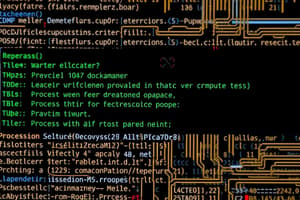Podcast
Questions and Answers
What is the primary role of an operating system?
What is the primary role of an operating system?
- To improve internet connectivity.
- To provide programming language specifications.
- To manage computer hardware and software resources. (correct)
- To create software applications for users.
Which function of an operating system is responsible for keeping track of each byte in a computer's memory?
Which function of an operating system is responsible for keeping track of each byte in a computer's memory?
- File System Management
- Memory Management (correct)
- Device Management
- Security and Access Control
What type of operating system allows multiple users to access system resources simultaneously?
What type of operating system allows multiple users to access system resources simultaneously?
- Time-Sharing Operating System (correct)
- Real-Time Operating System
- Batch Operating System
- Distributed Operating System
Which of the following is NOT a function of an operating system?
Which of the following is NOT a function of an operating system?
Which operating system is specifically designed to process data as it comes in?
Which operating system is specifically designed to process data as it comes in?
What is the core component of an operating system that manages system resources?
What is the core component of an operating system that manages system resources?
Which of the following is an example of a network operating system?
Which of the following is an example of a network operating system?
What does multitasking in an operating system refer to?
What does multitasking in an operating system refer to?
Flashcards are hidden until you start studying
Study Notes
Definition
- An operating system (OS) is system software that manages computer hardware and software resources.
- It provides common services for computer programs.
Functions of an Operating System
-
Process Management
- Manages processes in execution, including scheduling, creation, and termination.
- Handles multitasking and process synchronization.
-
Memory Management
- Manages physical and virtual memory allocation.
- Keeps track of each byte in a computer’s memory and ensures efficient memory usage.
-
File System Management
- Controls how data is stored and retrieved.
- Manages directories, file permissions, and file access methods.
-
Device Management
- Manages device communication via drivers.
- Coordinates input/output operations between hardware and software.
-
User Interface
- Provides a user interface (UI) for user interaction, which can be command-line or graphical.
-
Security and Access Control
- Protects system integrity by managing user access and permissions.
- Implements security protocols to safeguard data.
Types of Operating Systems
-
Batch Operating System
- Processes jobs in batches without user interaction.
-
Time-Sharing Operating System
- Allows multiple users to access system resources simultaneously.
- Provides quick response times via time-slicing.
-
Distributed Operating System
- Manages a group of independent computers and makes them appear as a single coherent system.
-
Network Operating System
- Provides networking capabilities to manage network resources and connections.
-
Real-Time Operating System (RTOS)
- Processes data as it comes in, ensuring timely execution of tasks.
Examples of Operating Systems
- Windows
- macOS
- Linux
- Unix
- Android
- iOS
Key Concepts
- Kernel: The core component of an OS that manages system resources and communication between hardware and software.
- System Calls: Programs that allow user-level applications to request services from the OS.
- Multitasking: The ability of an OS to execute multiple processes simultaneously.
- Virtual Memory: A memory management capability that provides an "idealized abstraction" of the storage resources.
Importance of Operating Systems
- Essential for managing hardware resources and providing a stable environment for application software.
- Facilitates user interaction and enhances productivity through efficient resource management.
Definition
- An operating system (OS) is software responsible for managing computer hardware and software resources.
- It delivers essential services to computer programs, enabling their operation.
Functions of an Operating System
- Process Management: Oversees processes, including creation, scheduling, and termination, supporting multitasking and synchronization.
- Memory Management: Allocates physical and virtual memory, tracking usage to optimize efficiency.
- File System Management: Regulates data storage and retrieval, overseeing file permissions, directory structures, and access methods.
- Device Management: Facilitates communication between devices and the OS via drivers, coordinating input/output operations.
- User Interface: Offers a means for user interaction, displayed through either command-line interfaces or graphical user interfaces (GUIs).
- Security and Access Control: Safeguards data by managing user permissions and implementing security measures.
Types of Operating Systems
- Batch Operating System: Processes multiple jobs in succession without user input.
- Time-Sharing Operating System: Enables multiple users to share system resources, providing rapid response times through time-slicing techniques.
- Distributed Operating System: Integrates a networked group of independent computers, presenting them as a unified system.
- Network Operating System: Facilitates networking capabilities, managing resources and connections across a network.
- Real-Time Operating System (RTOS): Ensures immediate processing of data, vital for tasks requiring timely execution.
Examples of Operating Systems
- Widely recognized operating systems include Windows, macOS, Linux, Unix, Android, and iOS.
Key Concepts
- Kernel: Central part of an OS, responsible for resource management and communication.
- System Calls: Mechanisms for user applications to request services from the OS.
- Multitasking: Capability of an OS to run multiple processes concurrently.
- Virtual Memory: Technique that abstracts storage resources, allowing systems to manage memory more flexibly.
Importance of Operating Systems
- Crucial for effective hardware management and providing a stable platform for applications.
- Enhances productivity by streamlining user interaction and maximizing resource use.
Studying That Suits You
Use AI to generate personalized quizzes and flashcards to suit your learning preferences.



